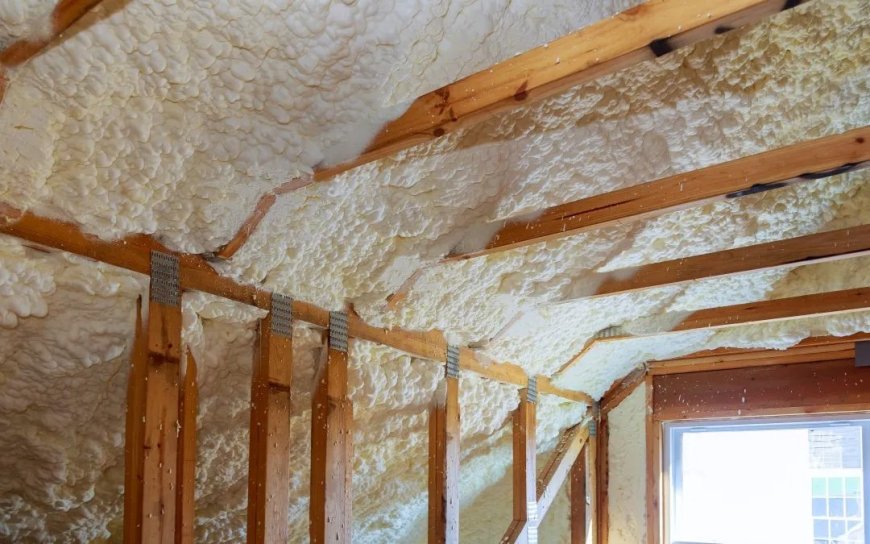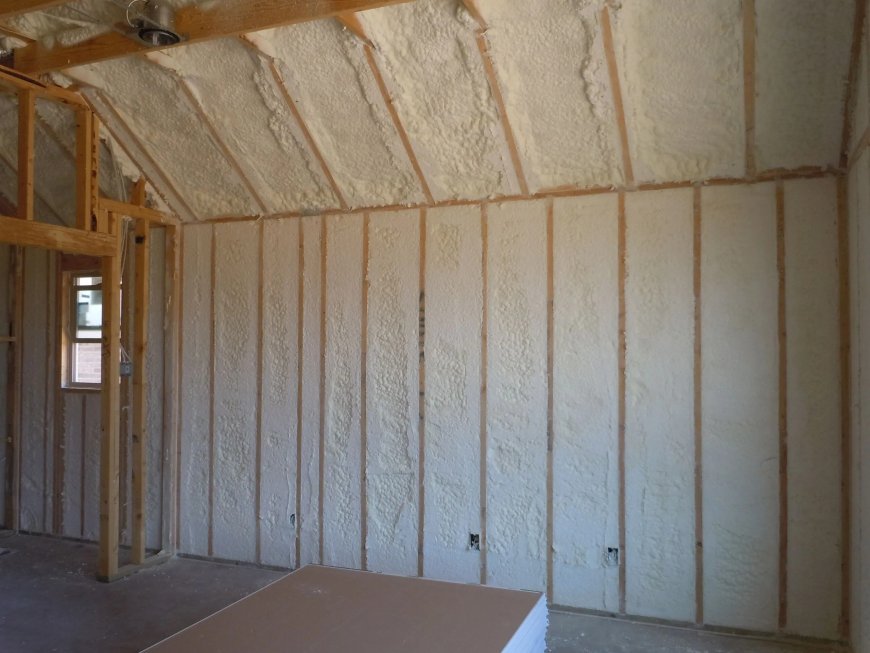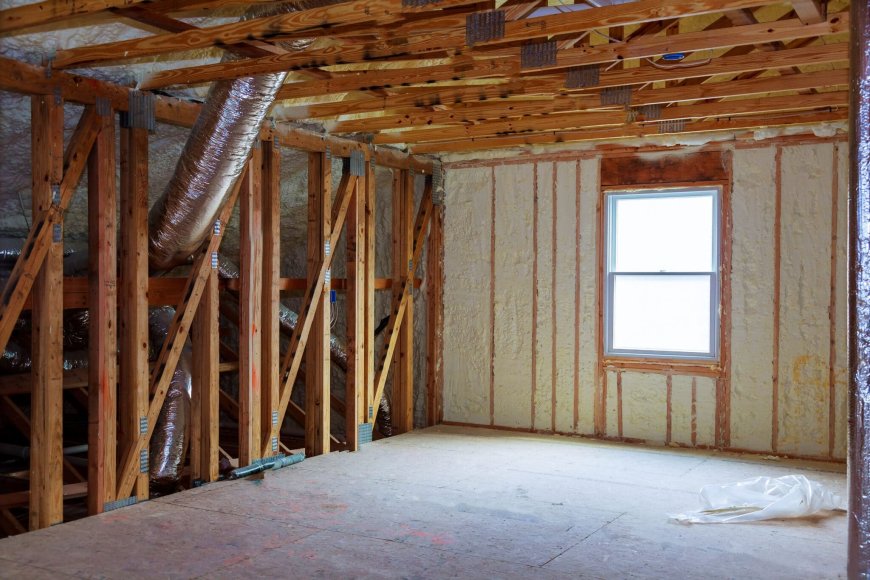Why Raleigh Commercial Buildings Are Switching to Spray Foam Insulation
This article explains why more and more Raleigh businesses are making the switch to spray foam insulation, and what you should consider when choosing the right insulation solution for your building.

As energy efficiency becomes an increasingly important factor for commercial building owners in Raleigh, spray foam insulation has gained significant popularity. With its ability to provide excellent thermal performance, air sealing, and moisture control, spray foam insulation in Raleigh offers a range of benefits for commercial properties.
This article explains why more and more Raleigh businesses are making the switch to spray foam insulation, and what you should consider when choosing the right insulation solution for your building.
The Benefits of Spray Foam Insulation for Raleigh Commercial Buildings
Spray foam insulation is a powerful and versatile solution for maintaining energy efficiency in commercial buildings. It works by expanding upon the application, filling every nook and cranny, and creating a seamless barrier that prevents heat transfer, air leaks, and moisture intrusion. Here are some of the key advantages of Raleigh commercial properties:
-
Energy Efficiency: Spray foam helps reduce the need for heating and cooling by providing a superior thermal barrier, keeping your building comfortable year-round.
-
Moisture Control: With Raleigh's humid climate, spray foam serves as a moisture barrier, helping to prevent mold, mildew, and water damage.
-
Enhanced Indoor Air Quality: By reducing drafts and air leakage, spray foam insulation helps maintain a stable, comfortable indoor environment while keeping dust, pollutants, and allergens out.
-
Reduced Energy Costs: By improving thermal efficiency, businesses can see a significant reduction in their energy bills, making it a smart long-term investment.
Commercial properties in Raleigh, particularly those with outdated insulation, benefit significantly from spray foam's superior performance. Its ability to seal gaps and improve thermal insulation means that businesses can rely less on HVAC systems, reducing overall energy consumption and operational costs.

Types of Spray Foam Insulation: Closed-Cell vs. Open-Cell
When considering spray foam insulation, commercial property owners have two primary options: closed-cell spray foam and open-cell spray foam. Both types offer distinct advantages, depending on your building's needs.
|
Insulation Type |
R-Value per Inch |
Moisture Resistance |
Best For |
|---|---|---|---|
|
Closed-Cell Spray Foam |
~6.5 |
Excellent |
Exterior walls, basements |
|
Open-Cell Spray Foam |
~3.6 |
Moderate |
Interior walls, soundproofing |
Closed-Cell Spray Foam
Closed-cell spray foam is denser and offers higher thermal resistance than open-cell foam. Its closed-cell structure makes it highly resistant to moisture, making it ideal for exterior walls and other areas vulnerable to water damage. In Raleigh’s climate, closed-cell spray foam is a great option for preventing mold growth, which is especially important in the humid summer months.
Open-Cell Spray Foam
Open-cell spray foam has a softer, less dense structure and provides excellent soundproofing. While it doesn’t offer the same level of moisture resistance as closed-cell foam, it’s still an effective insulator for interior walls, ceilings, and attics. Open-cell foam also expands more, making it easier to apply in spaces with a lot of obstructions.
Technical Specifications for Spray Foam Insulation
Understanding the technical specifications of spray foam insulation can help you make an informed decision for your commercial building. Here’s a quick comparison of key materials:
|
Insulation Type |
R-Value per Inch |
Air Seal |
Moisture Barrier |
Best Application Area |
|---|---|---|---|---|
|
Closed-Cell Spray Foam |
~6.5 |
Yes |
Yes |
Exterior walls, basements |
|
Open-Cell Spray Foam |
~3.6 |
Yes |
No |
Interior walls, ceilings |
Bonus Tip: Closed-cell foam offers higher R-values, making it the better option for areas exposed to the elements, while open-cell foam is ideal for improving soundproofing in interior spaces.

Key Considerations Before Installing Spray Foam Insulation
Before deciding on spray foam insulation, commercial insulation services in Raleigh should carefully consider several factors to ensure it’s the right choice for their needs.
1. Building Accessibility
For new constructions, spray foam insulation can be applied directly during the building process. However, retrofitting existing buildings with spray foam insulation may require additional planning to address accessibility challenges, such as working around existing ductwork, wiring, and other structures.
2. Climate Conditions
Raleigh’s humid subtropical climate can lead to high moisture levels, which may contribute to mold and mildew growth. Spray foam insulation is beneficial in this regard, as it acts as a moisture barrier. However, it’s important to ensure that proper ventilation is maintained to allow air circulation, especially in areas like attics and basements.
3. HVAC System Compatibility
Spray foam insulation can significantly reduce the strain on your building’s HVAC system by improving thermal efficiency. However, it’s crucial to ensure that your heating and cooling systems are properly balanced to accommodate the new insulation. A professional energy audit can help determine if your HVAC system needs adjustments.
4. Energy Rebates and Incentives
North Carolina sometimes offers rebates for energy-efficient improvements, including insulation. Be sure to check for any local or state incentives that can help offset installation costs.
5. Long-Term Durability
Spray foam insulation can last for decades when properly installed, providing long-term energy savings. However, it’s essential to have it installed by a qualified professional to avoid potential issues such as air leaks or improper application.
Common Questions About Commercial Spray Foam Insulation
Many commercial property owners in Raleigh have questions about spray foam insulation, including its installation process, cost, and performance. Here are some frequently asked questions:
1. Is spray foam insulation expensive?
While the initial cost of spray foam insulation can be higher than traditional insulation, it offers long-term savings by reducing energy bills. In addition, many Raleigh businesses qualify for local energy efficiency rebates, helping to offset installation costs.
2. Can spray foam insulation be applied over existing insulation?
Yes, spray foam insulation can often be applied over existing insulation, especially in cases of retrofit installations. However, it’s essential to consult with a professional to determine the best approach.
3. How long does spray foam insulation last?
When installed correctly, spray foam insulation can last for 30 years or more. It is highly durable and doesn’t settle or deteriorate over time.
4. Does spray foam insulation require maintenance?
Spray foam insulation generally requires little to no maintenance. However, if there are any issues with the integrity of the foam or air sealing, it’s important to have it inspected by a professional.
Why Choose Professional Spray Foam Insulation Installation?
Choosing the right insulation for your commercial building is a crucial decision that can impact your property’s energy efficiency, comfort, and long-term savings. Working with a professional insulation contractor ensures that the installation process is done correctly and in accordance with local building codes.
For businesses in Raleigh seeking expert guidance on spray foam insulation, Raleigh Excel Spray Foam Insulation is a trusted provider with years of experience in the industry. Specializing in energy-efficient insulation solutions for commercial properties, Raleigh Excel Spray Foam Insulation offers high-quality installation services and comprehensive insulation consultations.
Readers can learn more about Raleigh Excel Spray Foam Insulation's services:
-
Company: Raleigh Excel Spray Foam Insulation
-
Phone: (919) 301-9435
-
Email: info@raleighexcelsprayfoam.com
Learn more about Raleigh Excel Spray Foam Insulation
What's Your Reaction?
 Like
0
Like
0
 Dislike
0
Dislike
0
 Love
0
Love
0
 Funny
0
Funny
0
 Angry
0
Angry
0
 Sad
0
Sad
0
 Wow
0
Wow
0









































